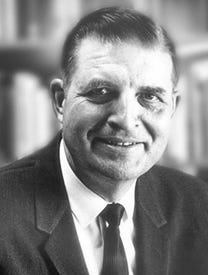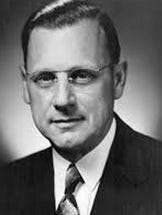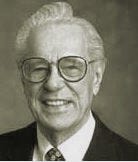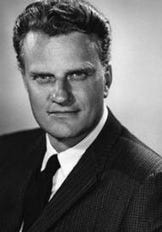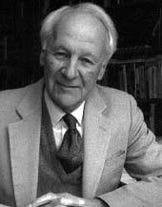Quick History Lesson Part 2: How We Have Understood “Christian Mission”
Part 2 of 2: The Rise of a New Generation of Evangelical Christians.
(Note: While I was working on my Master of Divinity at Trinity Evangelical Divinity School, I had the great privilege of studying under both Kenneth Kantzer and Carl Henry as they drew near to their retirement. Their wisdom, grace, and love for the Lord were evident.)
Because of the rise of the “Social Gospel,” conservative Christians embraced what was called the “Fundamentals” (see my last post).
“Evangelicals rejected the social gospel and thus shied away from any social agenda whatsoever for church and mission. The fundamentalist-modernist debate polarized the positions further, impacting mission work and theology.” (Ott and Strauss, Encountering Theology of Mission).
In response to this divide, in 1947 Carl F. H. Henry wrote a book titled The Uneasy Conscience of Modern Fundamentalism. Henry made the case that the liberals had mistakenly correlated the gospel to a political agenda while the conservatives had overreacted to the social gospel. When they preached on the kingdom of God, the conservatives saw it only as a future, other-worldly event and believed that the only mission of the church had to do with the “spiritual” matters of evangelism and personal piety.
Henry advocated moving beyond the modernist-fundamentalist divide and called for a course between the two.
“A Christianity without a passion to turn the world upside down is not reflective of apostolic Christianity.” (Carl F. H. Henry, The Uneasy Conscience of Modern Fundamentalism).
His plea was for evangelicalism to develop a compelling Christian mind but then to apply these thoughts to the culture at large to curtail evil.
“The battle against evil in all its forms must be pressed unsparingly; we must pursue the enemy, in politics, in economics, in science, in ethics—everywhere, in every field, we must pursue relentlessly.”
However, Henry made it clear that he believed that…
“The evangelical task primarily is the preaching of the Gospel, in the interest of individual regeneration by the supernatural grace of God, in such a way that divine redemption can be recognized as the best solution of our problems, individual and social.”
Henry was among a new generation of Christians that came to be known as the neo-evangelicals, a term coined by Harold Ockenga, one of the co-founders of Fuller Seminary.
Along with Ockenga and Henry, other leading voices in the neo-evangelical movement were Kenneth Kantzer, the founder of Trinity Evangelical Divinity School and evangelist Billy Graham.
Amid a desire to see the Gospel as a both/and (evangelism and social action), these new evangelicals believed that social action is either the means for evangelism or the consequence of evangelism.
The Lausanne Committee for World Evangelization (aka, the Lausanne Movement) has been a major influence in the definition of the mission of God’s people. It began in 1974 when “the gathering was called by a committee headed by Rev. Billy Graham and drew more than 2,300 evangelical leaders, from 150 countries… The gathering produced The Lausanne Covenant, a declaration that is ‘intended to define the necessity, responsibilities, and goals of spreading the Gospel.’”
The Lausanne Covenant defined “God’s Purpose:”
“He has been calling out from the world a people for himself, and sending his people back into the world to be his servants and his witnesses, for the extension of his kingdom, the building up of Christ’s body, and the glory of his name.” (“The Lausanne Covenant,” 1974, paragraph 1.)
John Stott chaired the drafting committee and is known as its chief architect.
And while the covenant was specifically for world evangelization (“to spread the good news that Jesus Christ died for our sins and was raised from the dead according to the Scriptures, and that as the reigning Lord he now offers the forgiveness of sins and the liberating gifts of the Spirit to all who repent and believe,” the results of evangelism “include obedience to Christ, incorporation into his Church and responsible service in the world.”
The covenant stated that Christians “should share (God’s) concern for justice and reconciliation throughout human society and for the liberation of men and women from every kind of oppression.”
Therefore,
“World evangelization requires the whole Church to take the whole gospel to the whole world.”
William Carey’s paradigm from the century before of defining Christian mission by interpreting the “Great Commission” (“go and make disciples”) as primarily the geographic expansion of Christianity by means of making converts through evangelism was still widely accepted in the fundamentalist evangelical camp.
“Protestants who used the Great Commission as their foundation for mission assumed the following: that salvation was individualistic; that salvation had to do primarily with a spiritual and personal relationship with Jesus Christ; that the primary calling of the church’s mission was geographic: Christians were called to ‘go’; that the ‘going’ was primarily from the west and north of the globe to the east and south…” (Charles Van Engen, “‘Mission’ Defined and Described,” in MissionShift: Global Mission Issues in the Third Millennium, ed. David Hesselgrave and Ed Stetzer, B&H Academic, 2010, p. 15)
But does the “Great Commission” tell us to “go and make converts?” No, it does not. What does it mean to “Go and make disciples?” What does it mean to be “sent” as missionaries into our world?
NEXT: What Does it Mean to “Make Disciples?”





